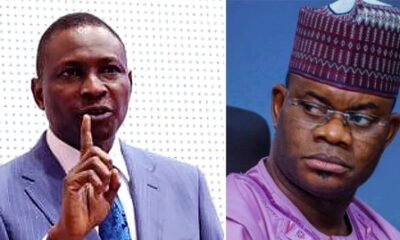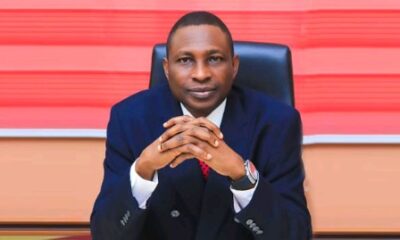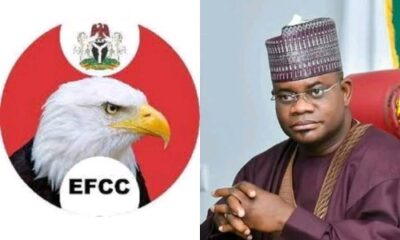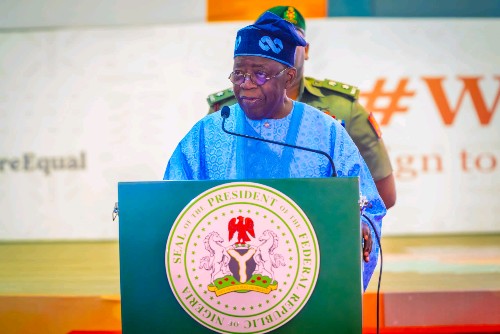*ICPC, Others Barred From Investigating Lagos Anti-Graft Cases
A new law signed by Governor Babajide Sanwo-Olu of Lagos State mandates agencies like the Economic and Financial Crimes Commission, the Independent Corrupt Practices and Other Related Offences Commission, and other anti-graft agencies to hand over corruption cases to the state government.
According to the legislation titled ‘Lagos State Public Complaints and Anti-Corruption Commission Law’ signed by Sanwo-Olu last week, a copy of which was obtained by our correspondent on Saturday, a new anti-corruption agency will have the exclusive rights to investigate financial crimes and corruption cases involving the finances of the Lagos State Government.
Section 13(3) of the law reads, “The commission shall upon the commencement of this law take over the investigation of all anti-corruption and financial crime cases involving the finances and assets of Lagos State Government being investigated by any other agency.”
Section 13(5) also states, “The commission shall have the power to the exclusion of any other agency or body to investigate and coordinate the investigation of corruption and financial crimes cases involving the finances and assets of the state government.”
Currently, three former Lagos governors, Bola Tinubu, Babatunde Fashola, and Akinwunmi Ambode, are said to be under investigation by the EFCC. The anti-graft agency is also investigating the Speaker of the Lagos State House of Assembly, Mudashiru Obasa, who helped facilitate the passage of the law.
The EFCC had in November last year written a letter to the Code of Conduct Bureau asking it to make available the asset declaration forms of Tinubu and Fashola as part of a wider probe. However, the details of Fashola’s probe have never been revealed.
The commission is also looking into petitions that Tinubu allegedly enriched himself by using a tax consultancy firm, Alpha Beta, to divert Lagos funds and commit tax evasion to the tune of N100bn.
The former governor was also reported to the EFCC for transporting cash-laden bullion vans to his home on the eve of the 2019 presidential election.
Similarly, the anti-graft agency, in 2019, commenced probing Ambode for alleged N9.9bn fraud.
Obasa was also grilled by the EFCC in October 2020, while his accounts were frozen by a court. He is accused of mismanaging public funds running into hundreds of millions of naira. While the Lagos speaker denied most of the allegations, he admitted that N80m as estacode was approved for the training of the wives of 20 lawmakers in Dubai.
According to PUNCH, the EFCC had also written to the Lagos Inland Revenue Service demanding information that could aid its investigation of its former Chairman, Babatunde Fowler. With the new law, however, the LIRS would have to hand over such information to the new Lagos State anti-graft agency which has exclusive rights to probe government finances.
However, the new law, which will ensure the creation of a Lagos State anti-corruption agency, mandates all other agencies investigating the finances of the state to hand over the case to the state government.
According to the law, the commission shall have the power to investigate any person or administrative action taken by any ministry, department, agency, or parastatal of the state government or any local government.
The new anti-graft agency shall investigate any offense under the criminal law of the state in relation to corruption and financial crimes, abuse of office, offenses relating to the administration of justice, obtaining by false pretenses, cybercrime, fake news, interception of emails, and fraudulent dealing with property debtors.
The law, which empowers the agency to investigate anyone who cannot explain his or her source of income, states that the anti-graft agency shall not be subjected to the direction and control of any authority.
The commission is, however, barred from investigating cases that are pending before the Lagos State House of Assembly, the Lagos State Executive Council or any court of law.
Corruption cases involving members of the Nigeria Police Force and the Armed Forces cannot be investigated by the commission, except acts of corruption committed by them as private individuals.
When asked if the EFCC would hand over its cases to the new Lagos State agency, the spokesman for the commission, Wilson Uwujaren, said he would call back. He had, however, yet to do so as of press time.
The Commissioner for Information in Lagos State, Mr Gbenga Omotoso, neither responded to a call nor replied to a text message on Saturday.
The spokesman for the Attorney General of the Federation, Dr Umar Gwandu, also asked for more time to respond when contacted. He had yet to respond to inquiries as of the time the paper went to bed.
However, Sanwo-Olu, speaking moments after his assent to the new anti-graft law, was quoted as saying the legislation was a testimony to the state government’s effort towards entrenching accountability in governance and checking malfeasance among officers entrusted with public resources.
The governor, who also signed the Lagos State Lotteries and Gaming Authority Bill 2021 the same day, argued that the state anti-corruption agency would be independent and complement efforts of similar agencies at the federal level.
The state Attorney General and Commissioner for Justice, Moyosore Onigbanjo, said the two bills signed by the governor were among those sponsored by the executive and passed by the House of Assembly to strengthen good governance.
He said 26 executive bills had been initiated since the inception of the administration.
Speaking with our correspondent, human rights lawyer, Chief Mike Ozekhome (SAN), said “the Lagos State law is valid,” adding that the constitution gives states the right to make such laws.
The senior advocate said corruption and crime are not on the exclusive legislative list and as such, the Lagos House of Assembly has more powers to create such law for the benefit of the state than the National Assembly, which created the EFCC and the ICPC.
Ozekhome argued that since the House of Assembly was in charge of making laws regarding taxation, charges, and finances of Lagos State, the Assembly also has superior powers regarding diversion of such funds.
He said, “It follows that anyone who commits a crime concerning such charges, fees or taxes is subject to the House of Assembly and that amounts to what is called an economic crime. It is therefore the House of Assembly that has the jurisdiction to deal with an economic crime within its own jurisdiction, not the Federal Government through the National Assembly like a principal controlling its pupils.
“Therefore, the law made by the Lagos Assembly regarding financial crimes is a valid law in line with Section 4 of the constitution and the Second Schedule Part 1 and 2 of the exclusive and concurrent legislative list. There is nothing contrary to the EFCC law at the federal level.
“If the EFCC wants to enforce its Act, it should go to other states except for Lagos because Lagos now has its own law. It is the same way the Federal High Court has rules guiding it.”
The Executive Director of Transparency International, Nigeria and Civil Society Legislative Advocacy Centre, Auwa Musa (Rafsanjani), told our correspondent that the new law could help in curbing corruption but it could cause a disagreement between the EFCC and the state government.
Rafsanjani noted that the current Chairman of the EFCC, Abdulrasheed Bawa, had opened investigations into Tinubu last year. He wondered if the new agency in Lagos could take over the case.
He, therefore, called on the state government to amend sections of the law that could cause conflict.
“The investigation of the former governor, Bola Tinubu, which was headed in Lagos by the current EFCC boss back when he headed the zonal office, brings to the fore a concern about the duplicity of function and possibility of inter-agency rivalry if the proposed commission had been established before now.
“This is not to even mention the perceived conflict of interest that would accompany any state-led efforts to investigate and prosecute its ‘kingmakers’ in a manner of speaking. In a bid not to throw the baby out with the bathwater, the Lagos government should thus amend the law, especially around its seemingly contentious or questionable provisions, to prevent any such foreseeable issues,” he said.
The Director, Centre for Anti-Corruption and Open Leadership, Debo Adeniran, said the creation of the anti-corruption agency in Lagos was commendable, adding that the EFCC and other federal agencies had their hands full already.
He kicked against the scrapping of the state anti-corruption agency but said efforts should be made by civil society organizations and other concerned entities to ensure that the new anti-corruption agency in Lagos State is not abused.
Adeniran also said the EFCC and other federal agencies could assist the state’s new anti-corruption agency in investigating crimes in order to boost its capacity.
Anti-corruption crusader, Inibehe Effiong, however, told newsmen that the Lagos law would not stand legal scrutiny.
Effiong said the powers given to the new anti-corruption agency were too many, adding that Section 4(5) of the constitution states that if any law made by a House of Assembly is inconsistent with any law validly made by the National Assembly, such law shall be void to the extent of its inconsistency.
The activist added, “The implication is that agencies like the EFCC and ICPC are established in furtherance of the exclusive legislative powers of the Federal Government of Nigeria. No state in Nigeria can compete with the Federal Government on anti-corruption matters, let alone supplant the statutory powers vested in federal anti-corruption agencies.
“It is blatant unconstitutionality for the Lagos State House of Assembly to seek to exclude EFCC and ICPC from investigating and prosecuting cases of corruption and economic and financial crimes with respect to the assets or finances of Lagos State.”

 BIG STORY11 hours ago
BIG STORY11 hours ago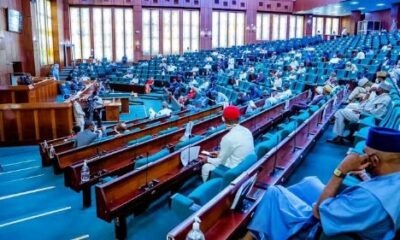
 BIG STORY4 days ago
BIG STORY4 days ago
 BIG STORY4 days ago
BIG STORY4 days ago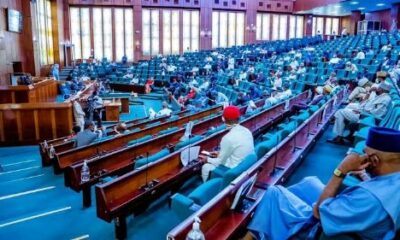
 BIG STORY4 days ago
BIG STORY4 days ago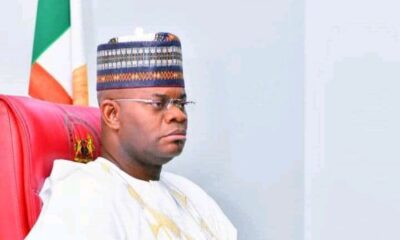
 BIG STORY3 days ago
BIG STORY3 days ago
 BIG STORY16 hours ago
BIG STORY16 hours ago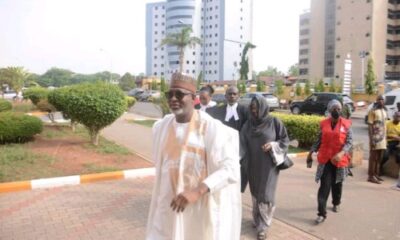
 BIG STORY5 days ago
BIG STORY5 days ago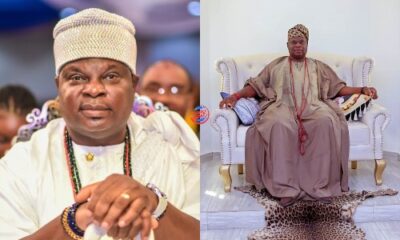
 BIG STORY1 day ago
BIG STORY1 day ago










